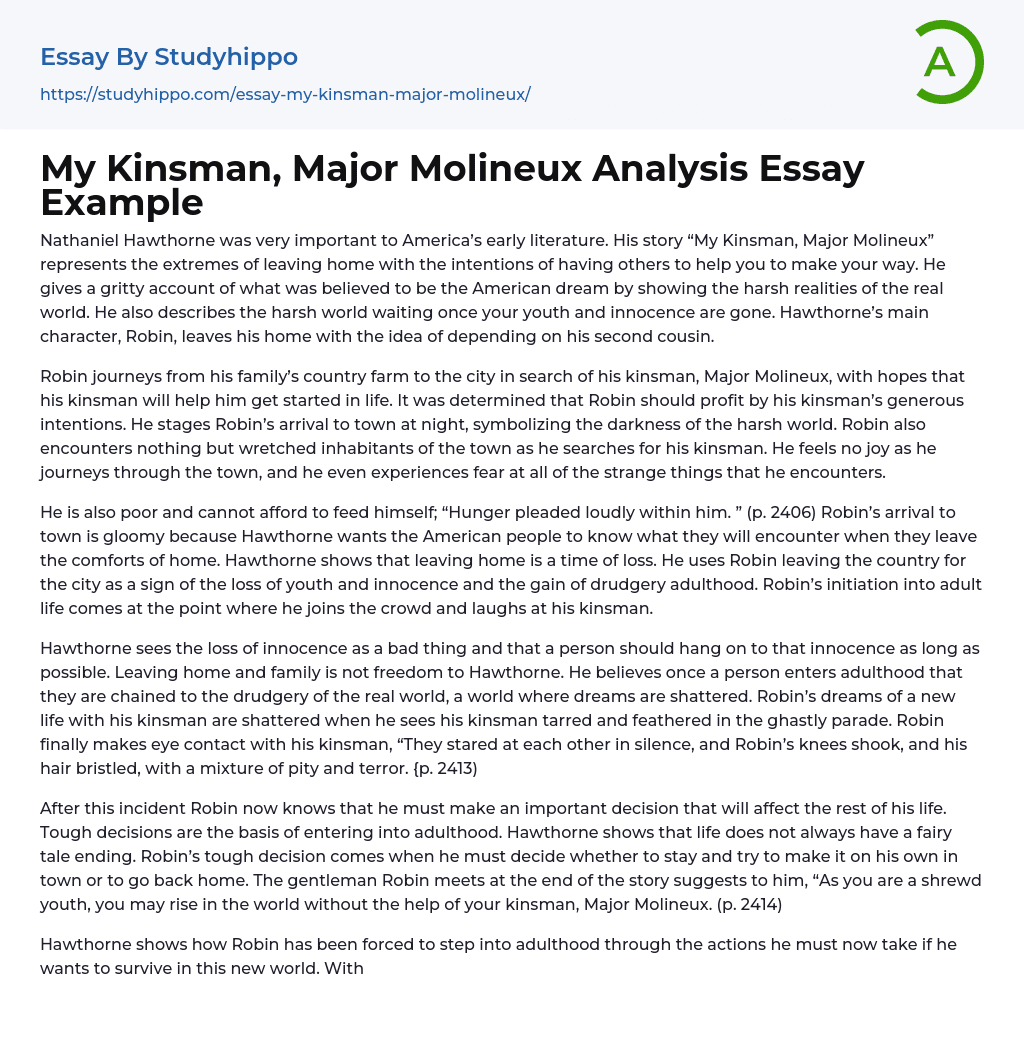Nathaniel Hawthorne was very important to America’s early literature. His story “My Kinsman, Major Molineux” represents the extremes of leaving home with the intentions of having others to help you to make your way. He gives a gritty account of what was believed to be the American dream by showing the harsh realities of the real world. He also describes the harsh world waiting once your youth and innocence are gone. Hawthorne’s main character, Robin, leaves his home with the idea of depending on his second cousin.
Robin journeys from his family’s country farm to the city in search of his kinsman, Major Molineux, with hopes that his kinsman will help him get started in life. It was determined that Robin should profit by his kinsman’s generous intentions. He
...stages Robin’s arrival to town at night, symbolizing the darkness of the harsh world. Robin also encounters nothing but wretched inhabitants of the town as he searches for his kinsman. He feels no joy as he journeys through the town, and he even experiences fear at all of the strange things that he encounters.
He is also poor and cannot afford to feed himself; “Hunger pleaded loudly within him. ” (p. 2406) Robin’s arrival to town is gloomy because Hawthorne wants the American people to know what they will encounter when they leave the comforts of home. Hawthorne shows that leaving home is a time of loss. He uses Robin leaving the country for the city as a sign of the loss of youth and innocence and the gain of drudgery adulthood. Robin’s initiation into adult life comes at the point wher
he joins the crowd and laughs at his kinsman.
Hawthorne sees the loss of innocence as a bad thing and that a person should hang on to that innocence as long as possible. Leaving home and family is not freedom to Hawthorne. He believes once a person enters adulthood that they are chained to the drudgery of the real world, a world where dreams are shattered. Robin’s dreams of a new life with his kinsman are shattered when he sees his kinsman tarred and feathered in the ghastly parade. Robin finally makes eye contact with his kinsman, “They stared at each other in silence, and Robin’s knees shook, and his hair bristled, with a mixture of pity and terror. {p. 2413)
After this incident Robin now knows that he must make an important decision that will affect the rest of his life. Tough decisions are the basis of entering into adulthood. Hawthorne shows that life does not always have a fairy tale ending. Robin’s tough decision comes when he must decide whether to stay and try to make it on his own in town or to go back home. The gentleman Robin meets at the end of the story suggests to him, “As you are a shrewd youth, you may rise in the world without the help of your kinsman, Major Molineux. (p. 2414)
Hawthorne shows how Robin has been forced to step into adulthood through the actions he must now take if he wants to survive in this new world. With that loss of innocence and youth, neither Robin nor his home will ever be the same again. Getting ahead in
life is a difficult thing to do and sometimes it leads to great pain and loss. Hawthorne wrote this story as a way of showing what he thinks it takes to get ahead in life. He tells his readers that even with well thought out plans and dreams life will throw curve balls.
He also shows that to get ahead in life one must leave the innocence of youth behind and harden one’s self against the ugliness of the world. He also shows that a person must know when to conform to the masses or be left behind. Robin knew, once he saw his kinsman, that he could not be seen as a sympathizer to the man the town had lynched. Robin decides to conform, “The contagion was spreading among the multitude, when all at once, it seized upon Robin, and he sent forth a shout of laughter that echoed through the street. (p. 2413)
Hawthorne wrote his short story to give the public a more realistic view of leaving home and trying to make it in the world. His story shows the more realistic cruel world that people face as they enter adulthood. Everyone goes through the transformation from the loss of innocence of our youth to the grittiness and drudgery of adulthood. While some may experience this change easier than others, the moral of this story is to determine your own path in life and not depend on others to make your way.
- Nightclub essays
- Book Summary essays
- Metaphor essays
- Reader essays
- Rhyme essays
- Literary devices essays
- Villain essays
- Books essays
- Genre essays
- Literary Criticism essays
- Writer essays
- Protagonist essays
- Simile essays
- Poem essays
- Book Report essays
- Book Review essays
- Greek Mythology essays
- Plot essays
- Tragic Hero essays
- Coming of Age essays
- Play essays
- Rhetoric essays
- Rhetorical Question essays
- Translation essays
- Understanding essays
- Reason essays
- Character essays
- Letter essays
- American Literature essays
- Literature Review essays
- Utopia essays
- Poetry Analysis essays
- Dante's Inferno essays
- Between The World and Me essays
- Incidents in The Life of a Slave Girl essays
- Flowers for Algernon essays
- Myth essays
- Everyday Use essays
- Boo Radley essays
- Genesis essays
- Richard iii essays
- Alice in Wonderland essays
- On the road essays
- Ozymandias essays
- The Nightingale essays
- Holden Caulfield essays
- Animal Farm essays
- 1984 essays
- A Hanging essays
- Shooting An Elephant essays




